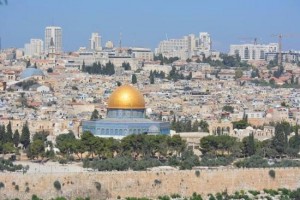Displaying items by tag: British Army
Peace of Jerusalem
Britain has a key role in the peace of Jerusalem. 100 years ago in late 1917, the British Army commanded by General Allenby entered Jerusalem and liberated it from the occupying Turkish and German forces. This then enabled the Balfour declaration issued earlier in the year to be implemented leading after many years to the establishment of the Jewish state in 1948. Psalm 122 tells us “Pray for the peace of Jerusalem may those who love you be secure.” Having seen a significant change in the military struggles in Iraq and Syria in recent weeks, attention is now turning back to Israel.
President Trump is significantly more pro-Israel than his predecessor and is planning to move the US embassy from Tel Aviv to Jerusalem. This would be highly symbolic as Jerusalem is in disputed territory whereas Tel Aviv is in the land allocated to Israel in 1948. Until 1967 the city was divided with East Jerusalem in Jordanian hands, but the city was reunited in the six day war. The UN and most nations do not recognise the legitimacy of Israel’s annexation of East Jerusalem. For many Muslims the status of Jerusalem is more important than the issue of the Palestinians. Jerusalem is their holy city.
Jerusalem is an emotive and controversial issue. Any changes to its status will have consequences. There have been recent terrorist attacks on the city but with Muslim and US relations deteriorating, changes to Jerusalem could create many serious issues.
So we go back to the scripture - pray for Jerusalem. Pray for God’s sovereign purposes, for His will for this important city and pray for the city’s safety in these increasingly uncertain times.
Millennials and army recruitment
Millennials are too self-interested to be easily recruited into the military, according to General Nick Carter, the head of the British Army. In a recent speech at an event, hosted by telecoms giant BT, he laid out some of the problems with recruiting for the reserves. A recent £3 million campaign to get more people to sign up to the part-time military was unsuccessful. Carter said: ‘We are now dealing with a different generation, Generation Y, born after 1985, and they have a slightly different expectation of life, which tends to be slightly self-interested, very committed. They are much more adaptable to the information age than my generation; they want to know what’s in it for them.’ Whatever their ideals, said Carter, the army is determined to see Generation Y serve its nation. Carter also used the opportunity to re-launch the Military Covenant - a hypothetical agreement between military personnel and the nation which means they forego certain rights like free speech while in uniform, but are properly looked after in return.

